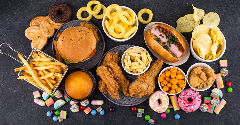News
Meal replacement in the Ozempic age and the intersection of food and pharma
21 May 2024The development of Ozempic and other GLP-1 drugs is radically changing the weight management category. Nutrition Business Journal explores the impact of these new weight-loss drugs on the nutrition industry in its most recent report.
By Rick Polito, Editor in Chief, Nutrition Business Journal
There was a time when the idea behind meal replacement for many consumers was something to help them lose weight, but there’s a new niche emerging of products to help them while they’re losing weight—something to make sure they’re getting enough nutrients and to help them tolerate the experience of being on Ozempic and other GLP-1 drugs.

We have already seen meal replacement heavyweight Abbott get into the game with its Protality shakes and, more recently, Herbalife entered the fray with a GLP-1 Nutrition Companion set. More are bound to come.
This niche is not something the Nutrition Business Journal analysts have tracking data on yet, but we do know the meal replacement market is one that seems an ideal fit for the weight-loss pharma revolution. It’s also a market where innovation can be scarce, and a new population of people with enough disposable income to afford co-pays on Ozempic and the like would be good news.
After growth shot up in the panic that greeted people when they climbed out of lockdown and realised Covid was no joke, the weight management meal supplement market in the United States, which topped $6 billion for the first time in 2023, has settled into the mid-single-digit growth. The NBJ model projects that growth could accelerate over the next several years, but the impact of weight loss pharma is a difficult one to predict. The expected market size of $7.8 billion in 2028 could easily prove conservative.
The challenge for brands courting Ozempic users may not be simple. Convincing people who have lost their appetite to go out and buy your product is no small feat. But early findings from Nielsen indicate that the convenience factor is already a winner. Early adopters in the Ozempic age are spending more than might have been expected in convenience stores, for instance. People who don’t want to spend much time on their food seem like an ideal customer for meal replacement.
On the other hand, we also know that we are only seeing the first wave of weight-loss pharma users now. As price and access adjust, new populations with new needs and tastes could emerge.
These are important matters for makers of meal replacement shakes and mixes to think about as they develop their products and position their value. Taste and mouth feel may matter more to these consumers than any group that came before, but finding the right pitch on health and wellness to a pharma-friendly demographic will also be important.
Learn more about the ways weight-loss drugs are impacting the nutrition industry in the United State
Related news

Japanese-inspired umami products expand into global consumer markets
17 May 2024
Brands are responding to shoppers' interest in cooking ingredients with deep flavours, by launching new products that emphasise umami-rich flavours inspired by Japanese cuisine.
Read more
Gatorade turns on the tap, introducing alkaline water to its latest product offerings
10 May 2024
PepsiCo’s Gatorade has diversified its product portfolio, launching unflavoured alkaline water and energy drink mixes.
Read more
Health and environmental food trends boost umami presence
9 May 2024
Plant-based products, lower salt formulations, and snacking options resonate with manufacturers looking to enhance umami flavour profiles in their offerings.
Read more
The rise of plant-based - and plastic-free - chewing gum
7 May 2024
Conventional chewing gum is typically made from a gum base that can contain plastic, paraffin, and synthetic resin. Enter the challenger brands making plant-based gum from chicle, the chewy sap of the Sapodilla tree. ‘Chew plants, not plastic,’ they sa...
Read more
Children’s food and drink claims centre on health and wellness
1 May 2024
A new report by HealthFocus International shows parents are at the forefront of health and wellness trends, leading the way for packaging claims on children’s products.
Read more
Innova research highlights how floral flavours are having a moment
22 Apr 2024
Florals are among the most desirable flavours for global consumers right now, a trend that is tied to their association with health and nutritional properties.
Read more
US legislative push to ban 7 food additives in schools
17 Apr 2024
Proposed legislation would prohibit the use of seven additives – six artificial colours and titanium dioxide – in food and drink served in US state schools.
Read more
Ultra-processed foods are the top concern among US consumers, study reveals
15 Apr 2024
New data from HealthFocus International shows that ultra-processed foods (UPFs) are the number one food concern for US consumers, ahead of saturated fats and sugar.
Read more
Retailers must do more to promote healthy eating
12 Apr 2024
UK retailers could play an even bigger role in helping consumers to make healthier food choices, according to Nesta, an innovation agency targeting social good.
Read more
Portugal officially adopts NutriScore
10 Apr 2024
Portugal has adopted the NutriScore as its official – but voluntary – front-of-pack nutrition label to promote healthy eating, with researchers calling this “a great victory for science and public health”.
Read more